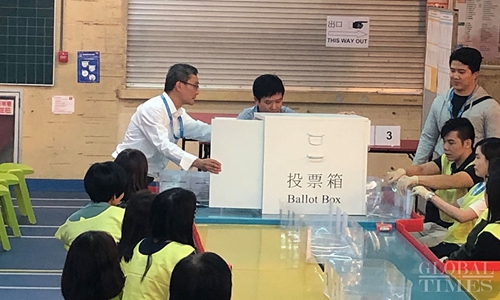HOME >> CHINA,SPECIAL-COVERAGE
Pan-democracy win should end violence in HK
By Yang Sheng, Chen Qingqing, Wang Wenwen and Bai Yunyi Source:Globaltimes.cn Published: 2019/11/25 9:22:46

Photo:Wang Wenwen/GT
Votes counting process of the 2019 Hong Kong District Council elections is yet to finish after a whole night and the final result hasn't announced either, but current situation showed that the pan-democracy candidates won against their pro-establishment opponents.
Experts noted the win is not an indication that voters support violence, as putting an end to the city's chaos is still the utmost priority among Hong Kong residents, and the elections should be a turning point in ending the riots.
The polling stations closed at 10:30 pm and according to the official data, voter turnout was confirmed at 71.2 percent of 4.1 million registered voters, compared to 47 percent during the 2015 polls, and surpassing the record of 58 percent set in the 2016's Legislative Council elections, where at least 10 localist candidates were elected.
Among the more than 1,000 candidates fighting for 452 seats among district councils of the Hong Kong Special Administrative Region (HKSAR), about 320 are from pro-establishment parties and more than 390 from pan-democratic groups. Over 370 candidates claimed to be "independent," while the remainder did not provide their political backgrounds.
At 9:15 am on Monday, the pan-democracy camp had secured 387 seats, while the pro-establishment camp had 61, according to Hong Kong-based television Cable News Channel.
The final results are scheduled to be announced late Monday morning. The elections were the first ones held amid the ongoing social unrest that has turned increasingly violent.
Ending violence
The pro-establishment camp received about 41 percent of the votes, and the pan-democracy camp garnered 57 percent as of 9:15 am Monday, which means the pan-democrats' victory was not an overwhelming one.
Voting for pan-democratic groups does not mean voters will stand with violence, radicals and Hong Kong separatists. No matter they are pro-establishment or pan-democratic groups, ending riots and chaos remains the utmost desire shared by Hong Kong society, Tang Fei, member of the council of the Chinese Association of Hong Kong and Macao Studies, told the Global Times.
The pro-establishment candidate for Tuen Men district (L20) Junius Ho said after his defeat, "This is a particular year, as we experience particular elections and have abnormal results."
Observers said that after months of social unrest, the district council election is a test of public opinion and a test of social sentiment in a tough year. They noted that the public is dissatisfied with the efforts of the local government and the pro-establishment camp.
They also believed that this is a highly politicized and sentimental election and it remains a test for those elected pan-democratic councilors as whether their community work will override political stance and if they do not serve the people wholeheartedly, they could expect to be abandoned by electorates.
"The HKSAR government tends to ignore potential crises, and its governing body tends to become bureaucratic and rigid," Li Xiaobing, an expert on Hong Kong, Macao and Taiwan studies at Nankai University in Tianjin, told the Global Times.
Li noted that the public's judgment and evaluation of the local government would be reflected in votes.
"The result of this district council elections shows that there are shortcomings in election tactics. The campaign of candidates was too traditional and lacks creativity and failed to win the public opinions in democratic politics. The pro-establishment camp lacks motivation and explosiveness, while oppositions can easily gain such power," said Li.
This year's election was held after months of protests and ongoing social unrest which made public opinion expression highly sentimental, Li noted.
Facing future
Hao Shinan, an expert at Shanghai International Studies University, who observes Hong Kong affairs, said that pro-establishment camp's defeat was a result created by issues related to the election cycle under a special political climate.
As Hao explained, this does not mean the pro-establishment camp does not stand a chance to make a comeback and nor does it foreshadow the results of next year's 2020 Hong Kong Legislative Council election.
The pro-establishment camp should remain calm and composed, and seek to cultivate ties at the grassroots level, which is where the party's traditional edge lies, rather than focus on mobilization and election techniques, Hao noted.
The HKSAR government must change its way of thinking and how it serves the public. "Real politicians should break their work routine, and become more creative and politically sensitive," Li said.
On major issues, pro-establishment parties should stand firm and remain confident in expressing their views such as saying "no" to violence and supporting legislation of Article 23 of the Basic Law, Hao said.
It should also focus on rallying support from the young people to change its traditional image, Hao noted.
Observers noted that this election showed obvious disadvantages of the pro-establishment camp, who either can't or don't know how to communicate with younger residents. In the future, they should strengthen youth outreach efforts, and effectively respond to their demands, as it would bring hope to Hong Kong's future.
Posted in: HK/MACAO/TAIWAN,FEATURE 2